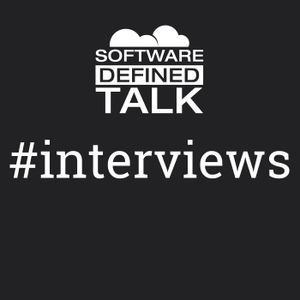![<pre><code> <p>People in large organizations avoid improving for improving&#39;s sake. They&#39;re very rarely proactive in transforming. Instead, it seems that management in most large organizations only act, and change, when they fear competition and failure. &quot;Everyone&quot; knows this is a bad strategy, and yet &quot;everyone&quot; does it. Perhaps we should embrace that behavior, or at least be empathetic, and figure out how to work with it.</p>
</code></pre>
<p>We discuss this problem and things to do in this episode.</p>
<p>Also, we find out why Coté always has bad breath.</p>
<p>Mood board:</p>
<ul>
<li>(6:30) - The daily, normal fears are going to drive what a business does more than large, one-off crises.</li>
<li>If your inventory is on an AS/400, then you're in trouble.</li>
<li>A chaos monkey for business, or, training for the unexpected.</li>
<li>"When there's not a crisis, every penny is squeezed out of technology."</li>
<li>Outsourcing, but the harmful type.</li>
<li>Hold your customers close, know your evolving storefront.</li>
<li>Now, software is the primary storefront.</li>
<li>To improve, you must have an enemy.</li>
<li>(20:51) "If you're trying to modernize, do this 'digital transformation,' it has to come from a place of an existential problem."</li>
<li>(21:26) To prepare for a major disruption, you have to prepare for a bunch of minor, incremental disruptions. You have to sell [the return] on paying for change.</li>
<li>(25:51) If you want to justify paying for continuous delivery, you have to find a problem to solve.</li>
<li>(27:41) They're bean counters, so just count the beans for them - just give them some beans and they're happy.</li>
<li>(28:58) As technologist, our views on revenue are not considered important or valid.</li>
<li>(29:21) Fear and loss are often easier to quantify, e.g., "if the database goes down, the business halts, and we loose millions a minute." Growth potential is harder to quantify and pitch, so we often ask for money based on fear and loss.</li>
<li>(29:36) "Even though I <em>think</em> about revenue streams, I've never been taken as seriously when I talk about them, as when I talk about fear."</li>
<li>Finding people outside of IT that care about software, like, in "the business."</li>
<li>(32:55) The only reason for technical agility, is business agility.</li>
<li>(33:44) If you do live through a crisis, try to internalize your failure to prepare so you only learn once from crisis, not again and again.</li>
<li>(35:33) The Business needs the fear, and then needs to ask IT to help with some optimistic technology action...cause no one's gonna believe IT.</li>
</ul>](https://us-central1-podcastguru-217d6.cloudfunctions.net/gcf_get_image?image_url=https://assets.fireside.fm/file/fireside-images/podcasts/images/7/752ee20c-8e7a-4ce1-8214-0a3fef88215c/cover.jpg&width=300&height=300&api_key=xqFmUFX5BHLBTA)
Software Defined Interviews
Software Defined Talk
Episode 3: Improvement requires fear, or, digital transformation by crisis and fear
JUL 6, 202038 MIN

Episode 3: Improvement requires fear, or, digital transformation by crisis and fear
JUL 6, 202038 MIN
Description
<p>People in large organizations avoid improving for improving's sake. They're very rarely proactive in transforming. Instead, it seems that management in most large organizations only act, and change, when they fear competition and failure. "Everyone" knows this is a bad strategy, and yet "everyone" does it. Perhaps we should embrace that behavior, or at least be empathetic, and figure out how to work with it.</p>
We discuss this problem and things to do in this episode.
Also, we find out why Coté always has bad breath.
Mood board:
- (6:30) - The daily, normal fears are going to drive what a business does more than large, one-off crises.
- If your inventory is on an AS/400, then you're in trouble.
- A chaos monkey for business, or, training for the unexpected.
- "When there's not a crisis, every penny is squeezed out of technology."
- Outsourcing, but the harmful type.
- Hold your customers close, know your evolving storefront.
- Now, software is the primary storefront.
- To improve, you must have an enemy.
- (20:51) "If you're trying to modernize, do this 'digital transformation,' it has to come from a place of an existential problem."
- (21:26) To prepare for a major disruption, you have to prepare for a bunch of minor, incremental disruptions. You have to sell [the return] on paying for change.
- (25:51) If you want to justify paying for continuous delivery, you have to find a problem to solve.
- (27:41) They're bean counters, so just count the beans for them - just give them some beans and they're happy.
- (28:58) As technologist, our views on revenue are not considered important or valid.
- (29:21) Fear and loss are often easier to quantify, e.g., "if the database goes down, the business halts, and we loose millions a minute." Growth potential is harder to quantify and pitch, so we often ask for money based on fear and loss.
- (29:36) "Even though I think about revenue streams, I've never been taken as seriously when I talk about them, as when I talk about fear."
- Finding people outside of IT that care about software, like, in "the business."
- (32:55) The only reason for technical agility, is business agility.
- (33:44) If you do live through a crisis, try to internalize your failure to prepare so you only learn once from crisis, not again and again.
- (35:33) The Business needs the fear, and then needs to ask IT to help with some optimistic technology action...cause no one's gonna believe IT.